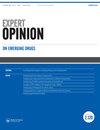Epidermal growth factor receptor-targeted therapy for the treatment of non-small cell lung cancer: a review of phase II and III trials
IF 2.7
3区 医学
Q2 PHARMACOLOGY & PHARMACY
引用次数: 1
Abstract
ABSTRACT Introduction Epidermal growth factor receptor (EGFR) is one of the most common driver gene mutations in non-small-cell lung cancer (NSCLC). EGFR-tyrosine kinase inhibitors (TKIs) monotherapy and EGFR-TKI combined with chemotherapy or anti-angiogenesis drugs have significantly prolonged the survival of patients with EGFR-mutant NSCLC. However, disease progression caused by acquired resistance to EGFR-TKIs is inevitable. And patients with EGFR exon 20ins showed limited efficacy to EGFR-TKIs. Areas covered In this review, we initially evaluated the efficacy of existing treatments for EGFR-mutant NSCLC. Second, we reviewed the ongoing phase II and III clinical trials, provided the latest results, discussed the scientific rationale of these trials and the potential development issues. Expert opinion The application of EGFR-TKIs has greatly changed the therapeutic strategies for advanced and resected NSCLC with EGFR mutations, and the 5-year overall survival (OS) rate for advanced NSCLC was close to 40%. The current research direction for the treatment of patients with EGFR mutations focuses on the following three aspects: uncommon EGFR mutation subtypes, brain metastases, and EGFR TKI-based combination therapy. Future studies on EGFR-mutant NSCLC therapy will focus on overcoming EGFR-TKI-related resistance, preventing drug resistance in advance, and developing bispecific antibody drugs.表皮生长因子受体靶向治疗非小细胞肺癌:II期和III期试验综述
摘要简介表皮生长因子受体(EGFR)是非小细胞癌症(NSCLC)最常见的驱动基因突变之一。EGFR酪氨酸激酶抑制剂(TKI)单药治疗和EGFR-TKI联合化疗或抗血管生成药物显著延长了EGFR突变型NSCLC患者的生存期。然而,由EGFR-TKIs获得性耐药性引起的疾病进展是不可避免的。EGFR外显子20ins患者对EGFR-TKIs的疗效有限。在这篇综述中,我们初步评估了现有治疗EGFR突变NSCLC的疗效。其次,我们回顾了正在进行的II期和III期临床试验,提供了最新结果,讨论了这些试验的科学原理和潜在的发展问题。专家意见EGFR-TKIs的应用极大地改变了具有EGFR突变的晚期和切除的NSCLC的治疗策略,晚期NSCLC的5年总生存率(OS)接近40%。目前治疗EGFR突变患者的研究方向集中在以下三个方面:不常见的EGFR突变亚型、脑转移和基于EGFR-TKI的联合治疗。未来对EGFR突变型NSCLC治疗的研究将集中在克服EGFR-TKI相关耐药性、提前预防耐药性和开发双特异性抗体药物上。
本文章由计算机程序翻译,如有差异,请以英文原文为准。
求助全文
约1分钟内获得全文
求助全文
来源期刊
CiteScore
5.90
自引率
0.00%
发文量
28
审稿时长
>12 weeks
期刊介绍:
Expert Opinion on Emerging Drugs (ISSN 1472-8214 [print], 1744-7623 [electronic]) is a MEDLINE-indexed, peer-reviewed, international journal publishing structured reviews on Phase II and Phase III drugs/drug classes emerging onto the market across all therapy areas, providing expert opinion on their potential impact on the current management of specific diseases.

 求助内容:
求助内容: 应助结果提醒方式:
应助结果提醒方式:


